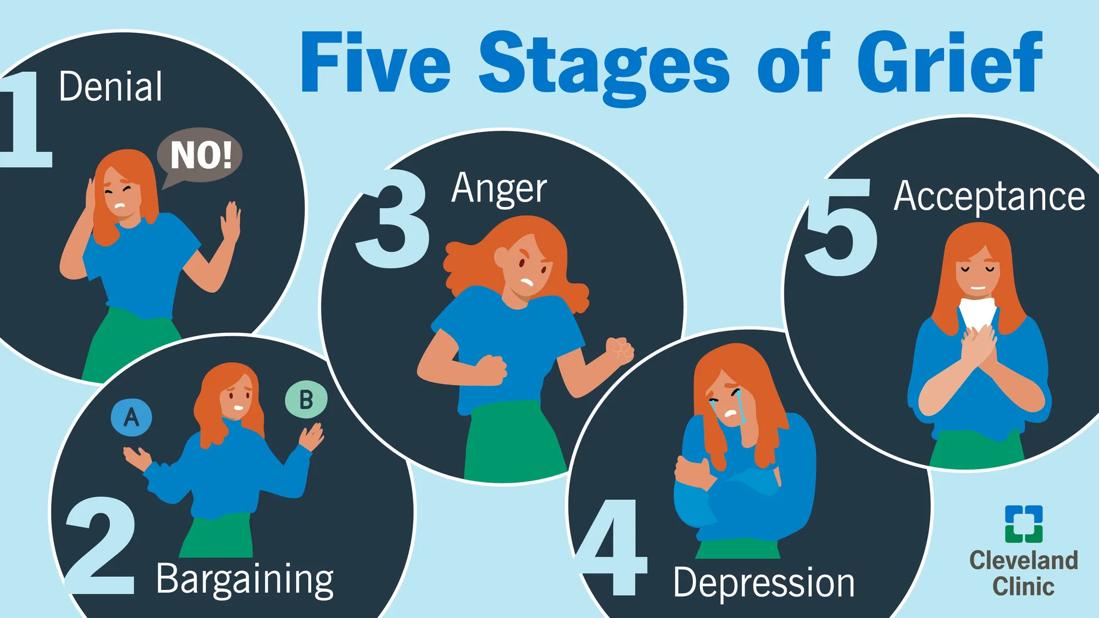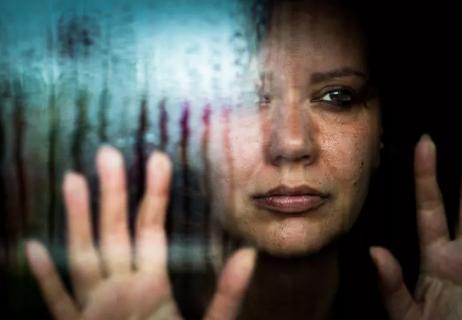Advertisement
The five phases of loss are denial, bargaining, anger, depression and acceptance — but they don’t always happen in that order

There’s no way around it: Grief is never easy. And though we tend to associate grief with death, other life events can trigger grief, too — from the end of a relationship and the loss of a job to financial hardship.
Advertisement
Cleveland Clinic is a non-profit academic medical center. Advertising on our site helps support our mission. We do not endorse non-Cleveland Clinic products or services. Policy
“Grief is a natural response to any kind of loss,” says clinical psychologist Regina Josell, PsyD. “People experience it in different ways, but typically, it includes a variety of intense emotions, like sadness, anger, irritability and guilt.”
Dr. Josell explains the five stages of grief, including what they are, how they manifest and when to seek support from a therapist who can help you cope.
When you hear people refer to the five stages of grief, they’re typically talking about:
Some people include other stages of grief, too, like shock, disorganization, testing and more. But the original five stages of grief (sometimes called the Kübler-Ross model) began with Swiss-American psychiatrist Elisabeth Kübler-Ross, who first outlined them in her 1969 book On Death and Dying.
“Dr. Kübler-Ross spent her career studying the dying process and the impact of death on survivors,” Dr. Josell shares. “She outlined this five-stage protocol of dying to help us understand the process.” The protocol was later applied to those impacted by someone else’s death.
Let’s delve deeper into each of them, and what you may be able to expect after the unthinkable happens.
Advertisement
“‘Denial’ refers to the difficulty in comprehending the reality of a loss,” Dr. Josell explains. “It can take a while to wrap your head around the fact that you’ve experienced a significant loss — that things are different, and they’re not going back to the way they were.”
Maybe your grandmother just passed away, but you still feel like she might pick up the phone if you call to say hello. Or you’re let go from your job, but you still get up early the next day, just in case your boss changes their mind.
Symptoms of denial during the grieving process might include:
The bargaining process sometimes happens before your loss has fully occurred, like when you think, “If I recover from cancer, I promise I’ll start going to church,” or “If my husband survives his heart attack, I’ll never argue with him again.”
But it can take place afterward, too, in the form of “if only” thinking:
This may not look like bargaining, but the thinking is similar. “We engage in a type of mental gymnastics to try to undo something that can’t be undone,” Dr. Josell clarifies.
“Anger is a perfectly natural response, and in the case of loss, it can be directed at a variety of sources,” Dr. Josell notes. It can also manifest as blame — the feeling that someone is at fault for your loss.
Your anger could also be less targeted, creeping up at random moments. “Sometimes, you’re just angry at innocent bystanders, like the guy in the checkout line at the grocery store who looked at you funny,” Dr. Josell illustrates. “It’s not always rational.”
Advertisement
Symptoms of the depression stage of grief can include:
Grief can cause physical symptoms, too, like aches and pains, changes in sleep patterns and increased inflammation in your body, which can worsen existing health issues and lead to new ones.
This stage of grief isn’t the same as major depressive disorder, a mental health condition that’s a combination of emotional, cognitive and physical symptoms. “But grief can turn into clinical depression, so it’s important to address it as you’re experiencing it,” Dr. Josell advises.
The pain of your grief may never fully fade. But acceptance means learning to live with the loss — acknowledging this new reality and allowing sorrow and joy to live alongside one another.
In the acceptance stage, you’re no longer immobilized by sadness. For example, you can hear a song on the radio that reminds you of your loved one without bursting into tears.
“Acceptance is a sense of understanding that there is a finality to what has happened,” Dr. Josell says. “You can hold onto your sadness while still experiencing good memories of the past and maintaining hope for the future.”
Advertisement
You might hear about other grief phases, too. Some people refer to seven stages of grief, incorporating additions like:
Some lists of the stages of grief may include others, as well, like guilt, processing, reconstructing — which are all valid feelings and experiences that may occur on your grieving journey.
These stages are meant to be descriptive, not prescriptive. This means they won’t necessarily apply to everyone or happen in the order presented. It’s common to weave in and out of stages and experience elements of them at the same time.
“Some people don’t go through all the stages,” Dr. Josell says, “and it’s not always nice and sequential. You may move in and out of different stages.”
Advertisement
There’s no set timeline for grief, and anyone who tells you to “move on” or “get over it” is underestimating and misunderstanding the weight of loss.
That said, the length of your grieving process depends on what kind of grief you’re experiencing.
In some sense, of course, all grief is complicated, stirring a tide of emotions that feel anything but straightforward. Whatever you’re dealing with, don’t put timelines or expectations on your grief.
If you’re experiencing intense emotional distress or struggling to return to your regular routine after your loss, consider seeking the help of a therapist. Talking about loss, sharing your distress and having your grief witnessed can significantly facilitate the healing process.
The bottom line, Dr. Josell says, is simple: “If you feel you’re suffering, go talk to somebody.”
Learn more about our editorial process.
Advertisement

Communicating with your family, setting expectations and finding healthy distractions can make life easier once your kiddo flies the coop

This coping mechanism can help you prepare and think through an impending loss

Like other kinds of stress, grieving a loss can impact you physically and emotionally

Grounding techniques, cognitive defusion and various types of talk therapy can all help

These unwanted thoughts, images or urges are often violent, disturbing and not aligned with your values — but they don’t mean you want to act on them

Slight increases are somewhat common from either the medication or changed habits

Look for signs like withdrawing from social eating and not gaining weight — and get treatment early if possible

Eating disorders are diagnosable mental health conditions, while disordered eating is unhealthy eating behavior that doesn’t meet the criteria for a diagnosis

If you’re feeling short of breath, sleep can be tough — propping yourself up or sleeping on your side may help

If you fear the unknown or find yourself needing reassurance often, you may identify with this attachment style

If you’re looking to boost your gut health, it’s better to get fiber from whole foods